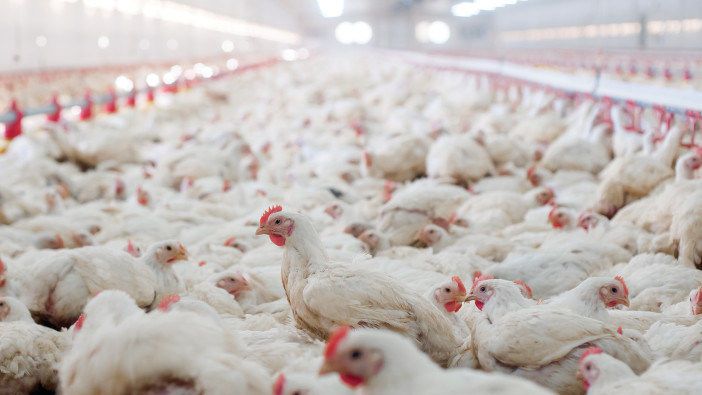As the Better Chicken Commitment deadline looms, a new report reveals many signatories are a long way from meeting the standards.
KFC has come under fire this year after it admitted it was not going to be able to fulfil the Better Chicken Commitment by the 2026 deadline. The fast-food chain said the supply chain was simply not set up to be able to provide it with enough slower growing chicken, because the infrastructure did not exist on the scale required.
Instead, it said it would push ahead with lower stocking densities of 30kg / sq metre, but continue to use conventional breeds.
Now Compassion in World Farming, one of the NGOs that originally designed the BCC standard, has published its annual report, ChickenTrack, that examines how all of the companies that signed up are doing.
The findings? KFC is far from alone.
Over 380 companies have signed up to the BCC in Europe and ChickenTrack 2024 evaluates the progress of the 93 most influential companies – selected on geographic relevance, size and overall ‘chicken footprint’ – across eight European countries. These include 37 retailers and meal kit providers, nine food service & hospitality companies, 29 restaurants, 11 manufacturers and seven producers.
Of the 93 companies tracked, 64 are reporting on progress, but 29 have yet to disclose any updates. The companies that are not disclosing how they are doing include in the UK Compass Group, Pizza Hut, Pizza Express and Prezzo.
Breed change
Breed change and stocking density remain two of the most challenging BCC production criteria to implement and have the lowest transition rates. Among companies reporting progress by criteria, only two – Schiever Distribution and Waitrose – report 100% compliance on stocking density, with an additional six at over 50% transition (Eataly Italy, Papa Johns UK, Greggs, Danone Group, Subway EMEA, Alcampo). Schiever Distribution is the only company to report 100% compliance on breed, with Eataly and Monoprix also making significant progress in this area, reporting over 50% compliance.
Two companies in the list have demonstrated strong year-on-year progress across a range of the criteria. Greggs significantly improved its compliance in 2024, increasing stocking density from 49% to 65% in 2024, natural light from 16% to 78% and enrichment from 64% to 85%. Premier Foods reported a 65% overall transition progress this year, marking a significant improvement on last year when it reported 45% compliance on stocking density and enrichment, and 100% compliance on Controlled Atmosphere Stunning (CAS).
In stark contrast, a significant number of companies are falling behind, reporting less than 20% transition on key BCC criteria. This includes 30 companies for stocking density, 35 for slower growing breeds, 17 for natural light, 20 for enrichment, and 10 for CAS. ChickenTrack 2024 describes this development as a “clear wake up call, urging companies to take their commitments seriously and act decisively now.”
This year, 11 companies are reporting on transition progress for the first time, including Eataly in Italy which has made significant strides – achieving 90% transition on stocking density, 80% on breed, and 70% on CAS. Four of these 11 companies are completely new to ChickenTrack in 2024: Big Mamma Group, Les 3 Brasseurs, Taiko Foods and Yo! Sushi.
M&S (for fresh chicken) and Norsk Kylling are two firms that have achieved 100% BCC compliance. ChickenTrack 2024 highlights two other companies that have published new BCC strategic roadmaps this year, providing a valuable blueprint for others to follow – Big Mamma Group (Europe) and Burger King (France).
With time ticking, it seems many companies are experiencing the challenges laid out in Poultry Business last year by Ruth Edge, head of sustainability at KFC. She told PB last year that while the company still had the ambition of moving towards the BCC, “It just won’t be in the timelines that are set out in the current commitment.”
One of the main reasons for this is that KFC buys cuts, rather than whole birds, and it is, therefore, reliant on choices made by others in the supply chain. Not enough other companies have signed up to the BCC, so there are not enough slower-growing birds on farms.
“Availability is a massive issue for us. Because retailers en masse haven’t moved towards slower-growing birds, we essentially can’t access it. We will deliver lower stocking density by 2026 for UK and Ireland chicken,” says Edge. “For the rest of our supply we don’t have a timeline at the moment.”
Dr. Tracey Jones, global director of food business, Compassion in World Farming said: “To make higher-welfare chicken the norm, we urge companies to adopt the BCC and invest in meaningful change through robust action plans and transparent progress reporting. Only when companies reach 100% compliance will we achieve the full impact for chickens.”
Better Chicken Commitment criteria
-
- Using slower-growing breeds of chicken
- 30kg/sq metre stocking density
- Providing enrichment such as natural light, perches and pecking substrates such as grain and straw
- Gas stunning
- Complying with third-party animal welfare auditing and annual public reporting


